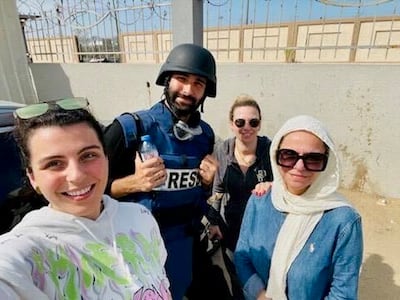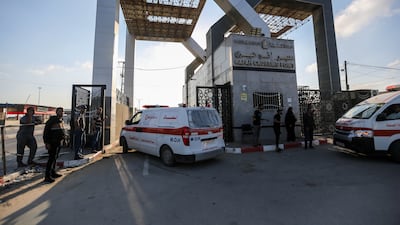Live updates: Follow the latest news on Israel-Gaza
Palestinian-American businessman Ahmed Beseiso has spent the past 27 days wondering if his family trapped in the Gaza Strip would survive Israel’s bombardment.
On Thursday, he learnt his loved ones were safe after they crossed into Egypt, part of an initial group of foreign nationals allowed to leave Gaza.
“It’s been hell on Earth” for Mr Beseiso and his family, he told The National, speaking from Salt Lake City in Utah, which he was visiting when the war broke out.
His mother, father, grandmother, two sisters and a nephew were allowed out of Gaza through the Rafah crossing following a diplomatic breakthrough that granted foreign nationals – including US citizens and their families – permission to leave the enclave for the first time since the Israel-Gaza war broke out on October 7.
“I'm happy my family's out, alive and in one piece,” Mr Beseiso said. “But they're gonna be traumatised for life – that's a fact.”
Israel has been bombarding the Gaza Strip with thousands of air strikes and has expanded its ground operations since Hamas militants attacked southern Israel on October 7, killing about 1,400 people and taking more than 200 hostage.
Israel's war against Hamas has so far killed more than 9,000 people, most of them women and children, according to local health authorities.
The Israeli military has repeatedly struck schools, hospitals and other civilian buildings, saying they are used by Hamas, leaving nowhere in Gaza safe.
Food, water medicine and electricity are in short supply, triggering a humanitarian crisis, and missiles rain down on an almost continuous basis.
The Rafah border crossing was opened to people for the first time on Wednesday, and a group of foreign nationals, including several American citizens, were allowed to leave the Strip. Dozens of wounded Palestinians were also evacuated to Egyptian hospitals.

The State Department said some 400 American citizens and their families – a total of roughly 1,000 people – would leave Gaza in the coming days.
President Joe Biden said on Thursday that 74 American citizens had left Gaza.
Mr Beseiso, 33, was born and raised in Gaza. He and his family moved to Salt Lake City in 2007, after Hamas took over the territory.
But last year, hoping that the situation had calmed, they decided to move back to Gaza to run the family business.
He was in the US by chance when the war started, he said. He still has other relatives and friends in Gaza, and two childhood friends have been killed.
Mr Beseiso said the incessant air strikes on Gaza, home to 2.3 million people, and the intermittent phone and internet service, are excruciating.
“When I would fall asleep I would have nightmares that my whole family is wiped off the map,” Mr Beseiso said. “I would wake up terrified.”
Palestinian and Arab Americans are critical of Mr Biden's response to the war.
The Pentagon does not monitor whether the weapons it gives Israel are being used to kill civilians and Mr Biden has pledged additional military aid.
His administration has also faced criticism for coordinating the evacuation of US citizens out of Israel in the days following the Hamas attack, without announcing plans for Americans in Gaza.
Mr Biden said he supports Israel's right to defend itself and has opposed a ceasefire, saying it would only benefit Hamas.
He has instead advocated “humanitarian pauses” to allow more aid in and let some people leave.
“People in Gaza didn't ask for aid, they want a ceasefire,” Mr Beseiso said.
The worse part for him and his family, he says, has been thinking about all those who remain in Gaza.
“I feel happy that my family's out, but I feel guilty, we're leaving so many people behind,” he said.
“How do you think they feel?”































